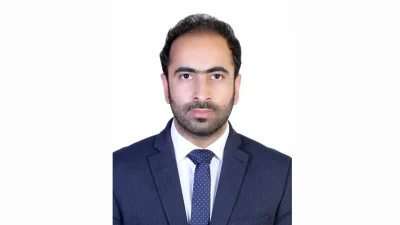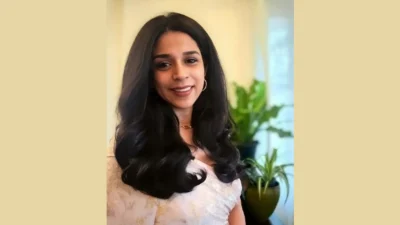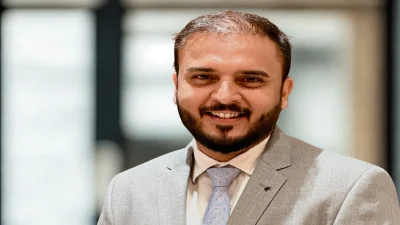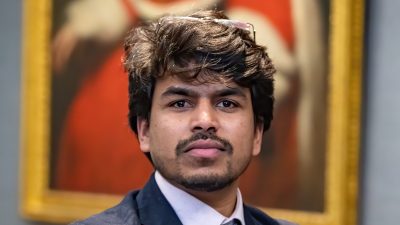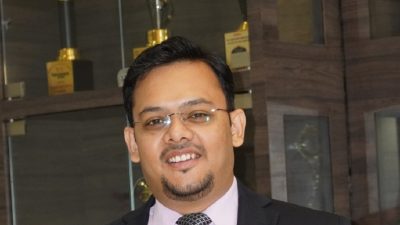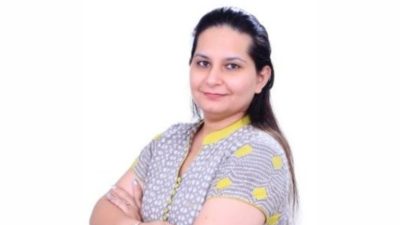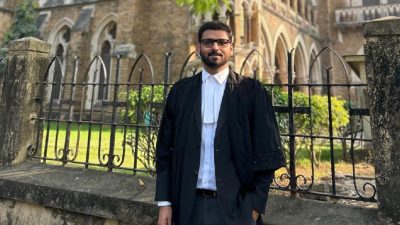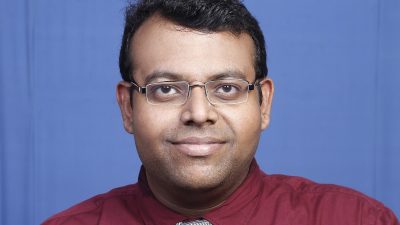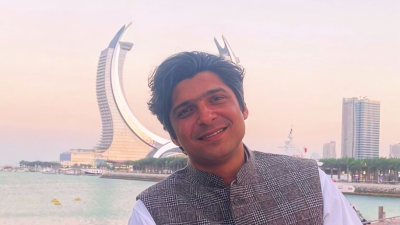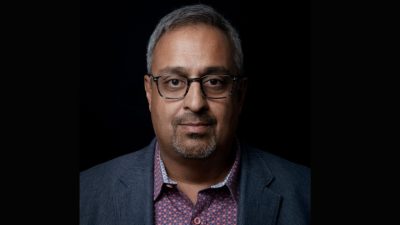Browse Legal & Corporate Interview Categories
2 days ago
155
In–House Counsel
Transforming Compliance through Digital Innovation, Multicultural Leadership and Global Contract Governance – Snehal Shirode
Snehal Shirode, Global Compliance Manager at Novartis Malaysia, has built a distinguished global legal career...
3 days ago
288
Interviews
Journey from Top-Tier Firms to Co-Founding a Full-Service Law Firm – Tejasv Anand
Tejasv Anand, a Disputes Lawyer and Partner and Co-founder at Vimarśa Law Offices, illustrates how...
4 days ago
488
Interviews
Journey from Literature to Law Exploring Data Privacy and Legal Innovation – Karishma Sundara
Karishma Sundara, Founder of Kintsugi Law, is a technology and data privacy lawyer whose journey...
Dec 5, 2025
279
Interviews
From Business Roots to a Career in Commercial and Complex Disputes – Pratik Rajopadhye
Pratik Rajopadhye, Managing Partner at Tavish Law Offices LLP brings a rare blend of commercial...
Dec 4, 2025
14783
Independent Practitioner
A First Generation Lawyer’s Path to Human Rights and Constitutional Advocacy – Sushant Inderjeet Singh
Sushant Inderjeet Singh, Advocate at the Supreme Court of India and various other courts of...
Dec 3, 2025
2005
In–House Counsel
A Decade in Law: The Rise of a First-Generation Corporate Lawyer – Saurabh Srirup
Saurabh Srirup, Manager – Legal at HPCL, views his journey in law not as a...
Dec 2, 2025
308
Interviews
From Political Science to Intellectual Property: A Journey of Curiosity, Strategy, and Innovation – Swati Dalal
Swati Dalal, Managing Associate at RNA, IP Attorneys, views her journey into law and Intellectual...
Dec 1, 2025
908
Independent Practitioner
How Purpose, Service and Mentorship Shaped My Journey in Law – Harsh Trivedi
Harsh Trivedi, Founder and Managing Partner at Trivedi & Parashar, views law not as a...
Nov 28, 2025
7726
In–House Counsel
From Litigator to General Counsel: 16 Years in Corporate Law & Compliance – Ramu S
With 16 years in the legal profession, Adv. Ramu S, Head of Legal at Karur...
Nov 27, 2025
335
Independent Practitioner
International Arbitration, Cross-Border Disputes, and the Future of Modern Legal Practice – Aamir Khan Wali
Aamir Khan Wali represents a new generation of globally oriented legal practitioners, with a career...
Nov 26, 2025
161
Interviews
Bhavya Sharma on Startup Compliance and Corporate Governance: Legal and CS Insights for Founders
This interview explores corporate governance, legal compliance, and startup advisory in India’s fast-growing entrepreneurial ecosystem....
Nov 25, 2025
171
Interviews
Data, AI, and the Future of IP Litigation: A Deep-Dive Conversation with Neel Chatterjee of King & Spalding
This interview explores the evolution of technology law, patent disputes, and data regulation in an...
2 days ago
155
In–House Counsel
Transforming Compliance through Digital Innovation, Multicultural Leadership and Global Contract Governance – Snehal Shirode
Snehal Shirode, Global Compliance Manager at Novartis Malaysia, has built a distinguished global legal career...
3 days ago
288
Interviews
Journey from Top-Tier Firms to Co-Founding a Full-Service Law Firm – Tejasv Anand
Tejasv Anand, a Disputes Lawyer and Partner and Co-founder at Vimarśa Law Offices, illustrates how...
4 days ago
488
Interviews
Journey from Literature to Law Exploring Data Privacy and Legal Innovation – Karishma Sundara
Karishma Sundara, Founder of Kintsugi Law, is a technology and data privacy lawyer whose journey...
Dec 5, 2025
279
Interviews
From Business Roots to a Career in Commercial and Complex Disputes – Pratik Rajopadhye
Pratik Rajopadhye, Managing Partner at Tavish Law Offices LLP brings a rare blend of commercial...
Dec 4, 2025
14783
Independent Practitioner
A First Generation Lawyer’s Path to Human Rights and Constitutional Advocacy – Sushant Inderjeet Singh
Sushant Inderjeet Singh, Advocate at the Supreme Court of India and various other courts of...
Dec 3, 2025
2005
In–House Counsel
A Decade in Law: The Rise of a First-Generation Corporate Lawyer – Saurabh Srirup
Saurabh Srirup, Manager – Legal at HPCL, views his journey in law not as a...
Dec 2, 2025
308
Interviews
From Political Science to Intellectual Property: A Journey of Curiosity, Strategy, and Innovation – Swati Dalal
Swati Dalal, Managing Associate at RNA, IP Attorneys, views her journey into law and Intellectual...
Dec 1, 2025
908
Independent Practitioner
How Purpose, Service and Mentorship Shaped My Journey in Law – Harsh Trivedi
Harsh Trivedi, Founder and Managing Partner at Trivedi & Parashar, views law not as a...
Nov 28, 2025
7726
In–House Counsel
From Litigator to General Counsel: 16 Years in Corporate Law & Compliance – Ramu S
With 16 years in the legal profession, Adv. Ramu S, Head of Legal at Karur...
Nov 27, 2025
335
Independent Practitioner
International Arbitration, Cross-Border Disputes, and the Future of Modern Legal Practice – Aamir Khan Wali
Aamir Khan Wali represents a new generation of globally oriented legal practitioners, with a career...
Nov 26, 2025
161
Interviews
Bhavya Sharma on Startup Compliance and Corporate Governance: Legal and CS Insights for Founders
This interview explores corporate governance, legal compliance, and startup advisory in India’s fast-growing entrepreneurial ecosystem....
Nov 25, 2025
171
Interviews
Data, AI, and the Future of IP Litigation: A Deep-Dive Conversation with Neel Chatterjee of King & Spalding
This interview explores the evolution of technology law, patent disputes, and data regulation in an...
2 days ago
155
In–House Counsel
Transforming Compliance through Digital Innovation, Multicultural Leadership and Global Contract Governance – Snehal Shirode
Snehal Shirode, Global Compliance Manager at Novartis Malaysia, has built a distinguished global legal career...
3 days ago
288
Interviews
Journey from Top-Tier Firms to Co-Founding a Full-Service Law Firm – Tejasv Anand
Tejasv Anand, a Disputes Lawyer and Partner and Co-founder at Vimarśa Law Offices, illustrates how...
4 days ago
488
Interviews
Journey from Literature to Law Exploring Data Privacy and Legal Innovation – Karishma Sundara
Karishma Sundara, Founder of Kintsugi Law, is a technology and data privacy lawyer whose journey...
Dec 5, 2025
279
Interviews
From Business Roots to a Career in Commercial and Complex Disputes – Pratik Rajopadhye
Pratik Rajopadhye, Managing Partner at Tavish Law Offices LLP brings a rare blend of commercial...
Dec 4, 2025
14783
Independent Practitioner
A First Generation Lawyer’s Path to Human Rights and Constitutional Advocacy – Sushant Inderjeet Singh
Sushant Inderjeet Singh, Advocate at the Supreme Court of India and various other courts of...
Dec 3, 2025
2005
In–House Counsel
A Decade in Law: The Rise of a First-Generation Corporate Lawyer – Saurabh Srirup
Saurabh Srirup, Manager – Legal at HPCL, views his journey in law not as a...
Dec 2, 2025
308
Interviews
From Political Science to Intellectual Property: A Journey of Curiosity, Strategy, and Innovation – Swati Dalal
Swati Dalal, Managing Associate at RNA, IP Attorneys, views her journey into law and Intellectual...
Dec 1, 2025
908
Independent Practitioner
How Purpose, Service and Mentorship Shaped My Journey in Law – Harsh Trivedi
Harsh Trivedi, Founder and Managing Partner at Trivedi & Parashar, views law not as a...
Nov 28, 2025
7726
In–House Counsel
From Litigator to General Counsel: 16 Years in Corporate Law & Compliance – Ramu S
With 16 years in the legal profession, Adv. Ramu S, Head of Legal at Karur...
Nov 27, 2025
335
Independent Practitioner
International Arbitration, Cross-Border Disputes, and the Future of Modern Legal Practice – Aamir Khan Wali
Aamir Khan Wali represents a new generation of globally oriented legal practitioners, with a career...
Nov 26, 2025
161
Interviews
Bhavya Sharma on Startup Compliance and Corporate Governance: Legal and CS Insights for Founders
This interview explores corporate governance, legal compliance, and startup advisory in India’s fast-growing entrepreneurial ecosystem....
Nov 25, 2025
171
Interviews
Data, AI, and the Future of IP Litigation: A Deep-Dive Conversation with Neel Chatterjee of King & Spalding
This interview explores the evolution of technology law, patent disputes, and data regulation in an...
2 days ago
155
In–House Counsel
Transforming Compliance through Digital Innovation, Multicultural Leadership and Global Contract Governance – Snehal Shirode
Snehal Shirode, Global Compliance Manager at Novartis Malaysia, has built a distinguished global legal career...
3 days ago
288
Interviews
Journey from Top-Tier Firms to Co-Founding a Full-Service Law Firm – Tejasv Anand
Tejasv Anand, a Disputes Lawyer and Partner and Co-founder at Vimarśa Law Offices, illustrates how...
4 days ago
488
Interviews
Journey from Literature to Law Exploring Data Privacy and Legal Innovation – Karishma Sundara
Karishma Sundara, Founder of Kintsugi Law, is a technology and data privacy lawyer whose journey...
Dec 5, 2025
279
Interviews
From Business Roots to a Career in Commercial and Complex Disputes – Pratik Rajopadhye
Pratik Rajopadhye, Managing Partner at Tavish Law Offices LLP brings a rare blend of commercial...
Dec 4, 2025
14783
Independent Practitioner
A First Generation Lawyer’s Path to Human Rights and Constitutional Advocacy – Sushant Inderjeet Singh
Sushant Inderjeet Singh, Advocate at the Supreme Court of India and various other courts of...
Dec 3, 2025
2005
In–House Counsel
A Decade in Law: The Rise of a First-Generation Corporate Lawyer – Saurabh Srirup
Saurabh Srirup, Manager – Legal at HPCL, views his journey in law not as a...
Dec 2, 2025
308
Interviews
From Political Science to Intellectual Property: A Journey of Curiosity, Strategy, and Innovation – Swati Dalal
Swati Dalal, Managing Associate at RNA, IP Attorneys, views her journey into law and Intellectual...
Dec 1, 2025
908
Independent Practitioner
How Purpose, Service and Mentorship Shaped My Journey in Law – Harsh Trivedi
Harsh Trivedi, Founder and Managing Partner at Trivedi & Parashar, views law not as a...
Nov 28, 2025
7726
In–House Counsel
From Litigator to General Counsel: 16 Years in Corporate Law & Compliance – Ramu S
With 16 years in the legal profession, Adv. Ramu S, Head of Legal at Karur...
Nov 27, 2025
335
Independent Practitioner
International Arbitration, Cross-Border Disputes, and the Future of Modern Legal Practice – Aamir Khan Wali
Aamir Khan Wali represents a new generation of globally oriented legal practitioners, with a career...
Nov 26, 2025
161
Interviews
Bhavya Sharma on Startup Compliance and Corporate Governance: Legal and CS Insights for Founders
This interview explores corporate governance, legal compliance, and startup advisory in India’s fast-growing entrepreneurial ecosystem....
Nov 25, 2025
171
Interviews
Data, AI, and the Future of IP Litigation: A Deep-Dive Conversation with Neel Chatterjee of King & Spalding
This interview explores the evolution of technology law, patent disputes, and data regulation in an...
2 days ago
155
In–House Counsel
Transforming Compliance through Digital Innovation, Multicultural Leadership and Global Contract Governance – Snehal Shirode
Snehal Shirode, Global Compliance Manager at Novartis Malaysia, has built a distinguished global legal career...
3 days ago
288
Interviews
Journey from Top-Tier Firms to Co-Founding a Full-Service Law Firm – Tejasv Anand
Tejasv Anand, a Disputes Lawyer and Partner and Co-founder at Vimarśa Law Offices, illustrates how...
4 days ago
488
Interviews
Journey from Literature to Law Exploring Data Privacy and Legal Innovation – Karishma Sundara
Karishma Sundara, Founder of Kintsugi Law, is a technology and data privacy lawyer whose journey...
Dec 5, 2025
279
Interviews
From Business Roots to a Career in Commercial and Complex Disputes – Pratik Rajopadhye
Pratik Rajopadhye, Managing Partner at Tavish Law Offices LLP brings a rare blend of commercial...
Dec 4, 2025
14783
Independent Practitioner
A First Generation Lawyer’s Path to Human Rights and Constitutional Advocacy – Sushant Inderjeet Singh
Sushant Inderjeet Singh, Advocate at the Supreme Court of India and various other courts of...
Dec 3, 2025
2005
In–House Counsel
A Decade in Law: The Rise of a First-Generation Corporate Lawyer – Saurabh Srirup
Saurabh Srirup, Manager – Legal at HPCL, views his journey in law not as a...
Dec 2, 2025
308
Interviews
From Political Science to Intellectual Property: A Journey of Curiosity, Strategy, and Innovation – Swati Dalal
Swati Dalal, Managing Associate at RNA, IP Attorneys, views her journey into law and Intellectual...
Dec 1, 2025
908
Independent Practitioner
How Purpose, Service and Mentorship Shaped My Journey in Law – Harsh Trivedi
Harsh Trivedi, Founder and Managing Partner at Trivedi & Parashar, views law not as a...
Nov 28, 2025
7726
In–House Counsel
From Litigator to General Counsel: 16 Years in Corporate Law & Compliance – Ramu S
With 16 years in the legal profession, Adv. Ramu S, Head of Legal at Karur...
Nov 27, 2025
335
Independent Practitioner
International Arbitration, Cross-Border Disputes, and the Future of Modern Legal Practice – Aamir Khan Wali
Aamir Khan Wali represents a new generation of globally oriented legal practitioners, with a career...
Nov 26, 2025
161
Interviews
Bhavya Sharma on Startup Compliance and Corporate Governance: Legal and CS Insights for Founders
This interview explores corporate governance, legal compliance, and startup advisory in India’s fast-growing entrepreneurial ecosystem....
Nov 25, 2025
171
Interviews
Data, AI, and the Future of IP Litigation: A Deep-Dive Conversation with Neel Chatterjee of King & Spalding
This interview explores the evolution of technology law, patent disputes, and data regulation in an...
2 days ago
155
In–House Counsel
Transforming Compliance through Digital Innovation, Multicultural Leadership and Global Contract Governance – Snehal Shirode
Snehal Shirode, Global Compliance Manager at Novartis Malaysia, has built a distinguished global legal career...
3 days ago
288
Interviews
Journey from Top-Tier Firms to Co-Founding a Full-Service Law Firm – Tejasv Anand
Tejasv Anand, a Disputes Lawyer and Partner and Co-founder at Vimarśa Law Offices, illustrates how...
4 days ago
488
Interviews
Journey from Literature to Law Exploring Data Privacy and Legal Innovation – Karishma Sundara
Karishma Sundara, Founder of Kintsugi Law, is a technology and data privacy lawyer whose journey...
Dec 5, 2025
279
Interviews
From Business Roots to a Career in Commercial and Complex Disputes – Pratik Rajopadhye
Pratik Rajopadhye, Managing Partner at Tavish Law Offices LLP brings a rare blend of commercial...
Dec 4, 2025
14783
Independent Practitioner
A First Generation Lawyer’s Path to Human Rights and Constitutional Advocacy – Sushant Inderjeet Singh
Sushant Inderjeet Singh, Advocate at the Supreme Court of India and various other courts of...
Dec 3, 2025
2005
In–House Counsel
A Decade in Law: The Rise of a First-Generation Corporate Lawyer – Saurabh Srirup
Saurabh Srirup, Manager – Legal at HPCL, views his journey in law not as a...
Dec 2, 2025
308
Interviews
From Political Science to Intellectual Property: A Journey of Curiosity, Strategy, and Innovation – Swati Dalal
Swati Dalal, Managing Associate at RNA, IP Attorneys, views her journey into law and Intellectual...
Dec 1, 2025
908
Independent Practitioner
How Purpose, Service and Mentorship Shaped My Journey in Law – Harsh Trivedi
Harsh Trivedi, Founder and Managing Partner at Trivedi & Parashar, views law not as a...
Nov 28, 2025
7726
In–House Counsel
From Litigator to General Counsel: 16 Years in Corporate Law & Compliance – Ramu S
With 16 years in the legal profession, Adv. Ramu S, Head of Legal at Karur...
Nov 27, 2025
335
Independent Practitioner
International Arbitration, Cross-Border Disputes, and the Future of Modern Legal Practice – Aamir Khan Wali
Aamir Khan Wali represents a new generation of globally oriented legal practitioners, with a career...
Nov 26, 2025
161
Interviews
Bhavya Sharma on Startup Compliance and Corporate Governance: Legal and CS Insights for Founders
This interview explores corporate governance, legal compliance, and startup advisory in India’s fast-growing entrepreneurial ecosystem....
Nov 25, 2025
171
Interviews
Data, AI, and the Future of IP Litigation: A Deep-Dive Conversation with Neel Chatterjee of King & Spalding
This interview explores the evolution of technology law, patent disputes, and data regulation in an...
2 days ago
155
In–House Counsel
Transforming Compliance through Digital Innovation, Multicultural Leadership and Global Contract Governance – Snehal Shirode
Snehal Shirode, Global Compliance Manager at Novartis Malaysia, has built a distinguished global legal career...
3 days ago
288
Interviews
Journey from Top-Tier Firms to Co-Founding a Full-Service Law Firm – Tejasv Anand
Tejasv Anand, a Disputes Lawyer and Partner and Co-founder at Vimarśa Law Offices, illustrates how...
4 days ago
488
Interviews
Journey from Literature to Law Exploring Data Privacy and Legal Innovation – Karishma Sundara
Karishma Sundara, Founder of Kintsugi Law, is a technology and data privacy lawyer whose journey...
Dec 5, 2025
279
Interviews
From Business Roots to a Career in Commercial and Complex Disputes – Pratik Rajopadhye
Pratik Rajopadhye, Managing Partner at Tavish Law Offices LLP brings a rare blend of commercial...
Dec 4, 2025
14783
Independent Practitioner
A First Generation Lawyer’s Path to Human Rights and Constitutional Advocacy – Sushant Inderjeet Singh
Sushant Inderjeet Singh, Advocate at the Supreme Court of India and various other courts of...
Dec 3, 2025
2005
In–House Counsel
A Decade in Law: The Rise of a First-Generation Corporate Lawyer – Saurabh Srirup
Saurabh Srirup, Manager – Legal at HPCL, views his journey in law not as a...
Dec 2, 2025
308
Interviews
From Political Science to Intellectual Property: A Journey of Curiosity, Strategy, and Innovation – Swati Dalal
Swati Dalal, Managing Associate at RNA, IP Attorneys, views her journey into law and Intellectual...
Dec 1, 2025
908
Independent Practitioner
How Purpose, Service and Mentorship Shaped My Journey in Law – Harsh Trivedi
Harsh Trivedi, Founder and Managing Partner at Trivedi & Parashar, views law not as a...
Nov 28, 2025
7726
In–House Counsel
From Litigator to General Counsel: 16 Years in Corporate Law & Compliance – Ramu S
With 16 years in the legal profession, Adv. Ramu S, Head of Legal at Karur...
Nov 27, 2025
335
Independent Practitioner
International Arbitration, Cross-Border Disputes, and the Future of Modern Legal Practice – Aamir Khan Wali
Aamir Khan Wali represents a new generation of globally oriented legal practitioners, with a career...
Nov 26, 2025
161
Interviews
Bhavya Sharma on Startup Compliance and Corporate Governance: Legal and CS Insights for Founders
This interview explores corporate governance, legal compliance, and startup advisory in India’s fast-growing entrepreneurial ecosystem....
Nov 25, 2025
171
Interviews
Data, AI, and the Future of IP Litigation: A Deep-Dive Conversation with Neel Chatterjee of King & Spalding
This interview explores the evolution of technology law, patent disputes, and data regulation in an...
2 days ago
155
In–House Counsel
Transforming Compliance through Digital Innovation, Multicultural Leadership and Global Contract Governance – Snehal Shirode
Snehal Shirode, Global Compliance Manager at Novartis Malaysia, has built a distinguished global legal career...
3 days ago
288
Interviews
Journey from Top-Tier Firms to Co-Founding a Full-Service Law Firm – Tejasv Anand
Tejasv Anand, a Disputes Lawyer and Partner and Co-founder at Vimarśa Law Offices, illustrates how...
4 days ago
488
Interviews
Journey from Literature to Law Exploring Data Privacy and Legal Innovation – Karishma Sundara
Karishma Sundara, Founder of Kintsugi Law, is a technology and data privacy lawyer whose journey...
Dec 5, 2025
279
Interviews
From Business Roots to a Career in Commercial and Complex Disputes – Pratik Rajopadhye
Pratik Rajopadhye, Managing Partner at Tavish Law Offices LLP brings a rare blend of commercial...
Dec 4, 2025
14783
Independent Practitioner
A First Generation Lawyer’s Path to Human Rights and Constitutional Advocacy – Sushant Inderjeet Singh
Sushant Inderjeet Singh, Advocate at the Supreme Court of India and various other courts of...
Dec 3, 2025
2005
In–House Counsel
A Decade in Law: The Rise of a First-Generation Corporate Lawyer – Saurabh Srirup
Saurabh Srirup, Manager – Legal at HPCL, views his journey in law not as a...
Dec 2, 2025
308
Interviews
From Political Science to Intellectual Property: A Journey of Curiosity, Strategy, and Innovation – Swati Dalal
Swati Dalal, Managing Associate at RNA, IP Attorneys, views her journey into law and Intellectual...
Dec 1, 2025
908
Independent Practitioner
How Purpose, Service and Mentorship Shaped My Journey in Law – Harsh Trivedi
Harsh Trivedi, Founder and Managing Partner at Trivedi & Parashar, views law not as a...
Nov 28, 2025
7726
In–House Counsel
From Litigator to General Counsel: 16 Years in Corporate Law & Compliance – Ramu S
With 16 years in the legal profession, Adv. Ramu S, Head of Legal at Karur...
Nov 27, 2025
335
Independent Practitioner
International Arbitration, Cross-Border Disputes, and the Future of Modern Legal Practice – Aamir Khan Wali
Aamir Khan Wali represents a new generation of globally oriented legal practitioners, with a career...
Nov 26, 2025
161
Interviews
Bhavya Sharma on Startup Compliance and Corporate Governance: Legal and CS Insights for Founders
This interview explores corporate governance, legal compliance, and startup advisory in India’s fast-growing entrepreneurial ecosystem....
Nov 25, 2025
171
Interviews
Data, AI, and the Future of IP Litigation: A Deep-Dive Conversation with Neel Chatterjee of King & Spalding
This interview explores the evolution of technology law, patent disputes, and data regulation in an...
2 days ago
155
In–House Counsel
Transforming Compliance through Digital Innovation, Multicultural Leadership and Global Contract Governance – Snehal Shirode
Snehal Shirode, Global Compliance Manager at Novartis Malaysia, has built a distinguished global legal career...
3 days ago
288
Interviews
Journey from Top-Tier Firms to Co-Founding a Full-Service Law Firm – Tejasv Anand
Tejasv Anand, a Disputes Lawyer and Partner and Co-founder at Vimarśa Law Offices, illustrates how...
4 days ago
488
Interviews
Journey from Literature to Law Exploring Data Privacy and Legal Innovation – Karishma Sundara
Karishma Sundara, Founder of Kintsugi Law, is a technology and data privacy lawyer whose journey...
Dec 5, 2025
279
Interviews
From Business Roots to a Career in Commercial and Complex Disputes – Pratik Rajopadhye
Pratik Rajopadhye, Managing Partner at Tavish Law Offices LLP brings a rare blend of commercial...
Dec 4, 2025
14783
Independent Practitioner
A First Generation Lawyer’s Path to Human Rights and Constitutional Advocacy – Sushant Inderjeet Singh
Sushant Inderjeet Singh, Advocate at the Supreme Court of India and various other courts of...
Dec 3, 2025
2005
In–House Counsel
A Decade in Law: The Rise of a First-Generation Corporate Lawyer – Saurabh Srirup
Saurabh Srirup, Manager – Legal at HPCL, views his journey in law not as a...
Dec 2, 2025
308
Interviews
From Political Science to Intellectual Property: A Journey of Curiosity, Strategy, and Innovation – Swati Dalal
Swati Dalal, Managing Associate at RNA, IP Attorneys, views her journey into law and Intellectual...
Dec 1, 2025
908
Independent Practitioner
How Purpose, Service and Mentorship Shaped My Journey in Law – Harsh Trivedi
Harsh Trivedi, Founder and Managing Partner at Trivedi & Parashar, views law not as a...
Nov 28, 2025
7726
In–House Counsel
From Litigator to General Counsel: 16 Years in Corporate Law & Compliance – Ramu S
With 16 years in the legal profession, Adv. Ramu S, Head of Legal at Karur...
Nov 27, 2025
335
Independent Practitioner
International Arbitration, Cross-Border Disputes, and the Future of Modern Legal Practice – Aamir Khan Wali
Aamir Khan Wali represents a new generation of globally oriented legal practitioners, with a career...
Nov 26, 2025
161
Interviews
Bhavya Sharma on Startup Compliance and Corporate Governance: Legal and CS Insights for Founders
This interview explores corporate governance, legal compliance, and startup advisory in India’s fast-growing entrepreneurial ecosystem....
Nov 25, 2025
171
Interviews
Data, AI, and the Future of IP Litigation: A Deep-Dive Conversation with Neel Chatterjee of King & Spalding
This interview explores the evolution of technology law, patent disputes, and data regulation in an...
2 days ago
155
In–House Counsel
Transforming Compliance through Digital Innovation, Multicultural Leadership and Global Contract Governance – Snehal Shirode
Snehal Shirode, Global Compliance Manager at Novartis Malaysia, has built a distinguished global legal career...
3 days ago
288
Interviews
Journey from Top-Tier Firms to Co-Founding a Full-Service Law Firm – Tejasv Anand
Tejasv Anand, a Disputes Lawyer and Partner and Co-founder at Vimarśa Law Offices, illustrates how...
4 days ago
488
Interviews
Journey from Literature to Law Exploring Data Privacy and Legal Innovation – Karishma Sundara
Karishma Sundara, Founder of Kintsugi Law, is a technology and data privacy lawyer whose journey...
Dec 5, 2025
279
Interviews
From Business Roots to a Career in Commercial and Complex Disputes – Pratik Rajopadhye
Pratik Rajopadhye, Managing Partner at Tavish Law Offices LLP brings a rare blend of commercial...
Dec 4, 2025
14783
Independent Practitioner
A First Generation Lawyer’s Path to Human Rights and Constitutional Advocacy – Sushant Inderjeet Singh
Sushant Inderjeet Singh, Advocate at the Supreme Court of India and various other courts of...
Dec 3, 2025
2005
In–House Counsel
A Decade in Law: The Rise of a First-Generation Corporate Lawyer – Saurabh Srirup
Saurabh Srirup, Manager – Legal at HPCL, views his journey in law not as a...
Dec 2, 2025
308
Interviews
From Political Science to Intellectual Property: A Journey of Curiosity, Strategy, and Innovation – Swati Dalal
Swati Dalal, Managing Associate at RNA, IP Attorneys, views her journey into law and Intellectual...
Dec 1, 2025
908
Independent Practitioner
How Purpose, Service and Mentorship Shaped My Journey in Law – Harsh Trivedi
Harsh Trivedi, Founder and Managing Partner at Trivedi & Parashar, views law not as a...
Nov 28, 2025
7726
In–House Counsel
From Litigator to General Counsel: 16 Years in Corporate Law & Compliance – Ramu S
With 16 years in the legal profession, Adv. Ramu S, Head of Legal at Karur...
Nov 27, 2025
335
Independent Practitioner
International Arbitration, Cross-Border Disputes, and the Future of Modern Legal Practice – Aamir Khan Wali
Aamir Khan Wali represents a new generation of globally oriented legal practitioners, with a career...
Nov 26, 2025
161
Interviews
Bhavya Sharma on Startup Compliance and Corporate Governance: Legal and CS Insights for Founders
This interview explores corporate governance, legal compliance, and startup advisory in India’s fast-growing entrepreneurial ecosystem....
Nov 25, 2025
171
Interviews
Data, AI, and the Future of IP Litigation: A Deep-Dive Conversation with Neel Chatterjee of King & Spalding
This interview explores the evolution of technology law, patent disputes, and data regulation in an...
2 days ago
155
In–House Counsel
Transforming Compliance through Digital Innovation, Multicultural Leadership and Global Contract Governance – Snehal Shirode
Snehal Shirode, Global Compliance Manager at Novartis Malaysia, has built a distinguished global legal career...
3 days ago
288
Interviews
Journey from Top-Tier Firms to Co-Founding a Full-Service Law Firm – Tejasv Anand
Tejasv Anand, a Disputes Lawyer and Partner and Co-founder at Vimarśa Law Offices, illustrates how...
4 days ago
488
Interviews
Journey from Literature to Law Exploring Data Privacy and Legal Innovation – Karishma Sundara
Karishma Sundara, Founder of Kintsugi Law, is a technology and data privacy lawyer whose journey...
Dec 5, 2025
279
Interviews
From Business Roots to a Career in Commercial and Complex Disputes – Pratik Rajopadhye
Pratik Rajopadhye, Managing Partner at Tavish Law Offices LLP brings a rare blend of commercial...
Dec 4, 2025
14783
Independent Practitioner
A First Generation Lawyer’s Path to Human Rights and Constitutional Advocacy – Sushant Inderjeet Singh
Sushant Inderjeet Singh, Advocate at the Supreme Court of India and various other courts of...
Dec 3, 2025
2005
In–House Counsel
A Decade in Law: The Rise of a First-Generation Corporate Lawyer – Saurabh Srirup
Saurabh Srirup, Manager – Legal at HPCL, views his journey in law not as a...
Dec 2, 2025
308
Interviews
From Political Science to Intellectual Property: A Journey of Curiosity, Strategy, and Innovation – Swati Dalal
Swati Dalal, Managing Associate at RNA, IP Attorneys, views her journey into law and Intellectual...
Dec 1, 2025
908
Independent Practitioner
How Purpose, Service and Mentorship Shaped My Journey in Law – Harsh Trivedi
Harsh Trivedi, Founder and Managing Partner at Trivedi & Parashar, views law not as a...
Nov 28, 2025
7726
In–House Counsel
From Litigator to General Counsel: 16 Years in Corporate Law & Compliance – Ramu S
With 16 years in the legal profession, Adv. Ramu S, Head of Legal at Karur...
Nov 27, 2025
335
Independent Practitioner
International Arbitration, Cross-Border Disputes, and the Future of Modern Legal Practice – Aamir Khan Wali
Aamir Khan Wali represents a new generation of globally oriented legal practitioners, with a career...
Nov 26, 2025
161
Interviews
Bhavya Sharma on Startup Compliance and Corporate Governance: Legal and CS Insights for Founders
This interview explores corporate governance, legal compliance, and startup advisory in India’s fast-growing entrepreneurial ecosystem....
Nov 25, 2025
171
Interviews
Data, AI, and the Future of IP Litigation: A Deep-Dive Conversation with Neel Chatterjee of King & Spalding
This interview explores the evolution of technology law, patent disputes, and data regulation in an...
Most Popular Interviews
View AllInterviews • 07 Dec 2023
98599
"All legal systems cannot deviate from the basic principle of 'Justice'. The way it is delivered may be different"- Jurist Dr. Srikant Parthasarathy, Senior Managing Partner, Chakra Legal
This interview has been published by Priyanka Karwa and The SuperLawyer Team Can you share with our listeners your journey and what led you to...
Manager-Legal • 11 Jan 2023
74553
Jyoti Kapoor, Senior Manager (Legal Counsel) at Diageo, In a Discussion With SuperLawyer On Unconventional Career Options In Law
This interview has been published by Prabhjot Singh, Priyanka Karwa and The SuperLawyer Team What motivated you to choose law as a career? And how...
AOR • 28 Mar 2025
68903
"One of the most significant lessons I’ve learned is that you must never allow yourself to be caught off guard. Being fully prepared not only helps in presenting your arguments convincingly but also helps you gain the court’s confidence." - Ramchandra Madan, Advocate on Record at the Supreme Court of India.
This interview has been published by Anshi Mudgal and The SuperLawyer Team With such a diverse range of skills and experiences, when you reflect on your journey,...

